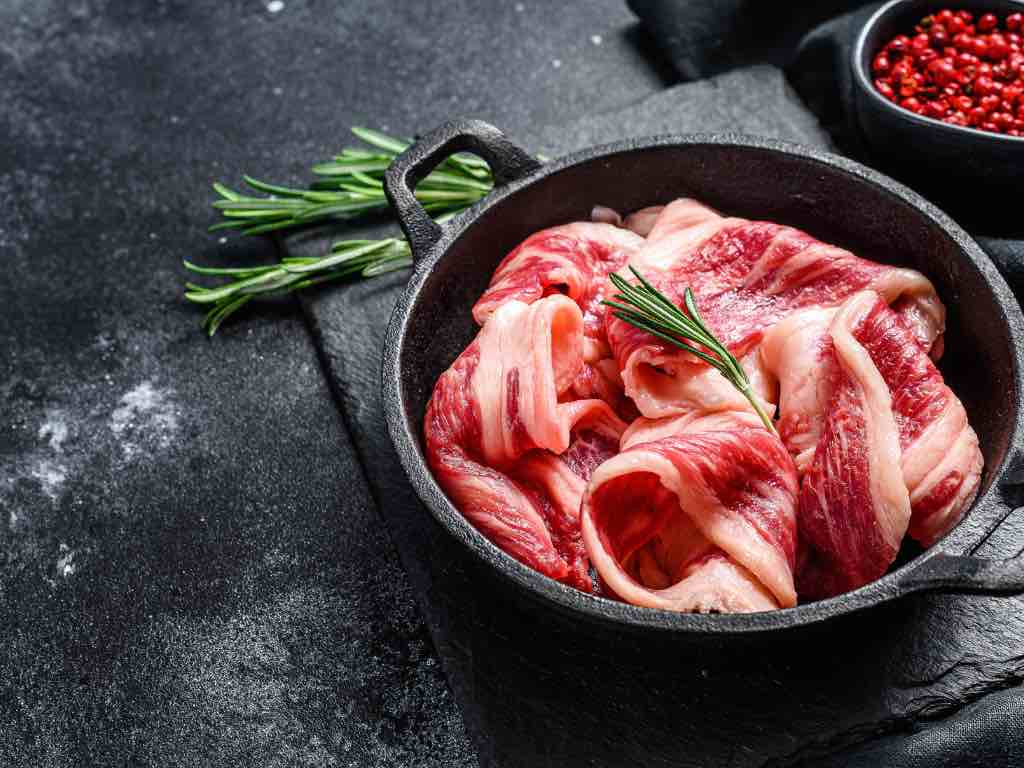
Embracing Diversity: Exploring the World of Halal Bacon Beef
|
|
Time to read 5 min
Welcome to One Stop Halal!
Written by: Samir P.
|
|
Time to read 5 min
In a world where culinary boundaries blur and cultural exchange thrives, "halal bacon beef" may initially sound like an oxymoron. However, it represents a fascinating intersection of culinary traditions, religious dietary laws, and modern culinary innovation. In this blog post, we'll delve into the concept of halal bacon beef, exploring its origins, significance, and how it reflects the rich tapestry of global cuisine.
To understand the concept of "halal bacon beef," it's crucial to grasp the significance of both "halal" and "bacon" in culinary contexts.
Bacon Halal beef emerged as a response to the growing demand for halal alternatives to traditional pork-based products. For Muslims adhering to halal dietary guidelines, the absence of pork can pose challenges when trying to replicate certain flavors and textures commonly found in non-halal cuisines.
To address this gap, culinary innovators began experimenting with alternative ingredients and techniques to create halal versions of bacon—one such adaptation involved using beef, a permissible meat in Islam, as a substitute for pork. By applying similar curing and smoking methods used in traditional bacon production, chefs could recreate bacon's familiar taste and texture while adhering to halal dietary restrictions.
Halal bacon beef represents more than just a culinary innovation; it embodies the adaptability and diversity of Muslim cuisine. By reimagining classic dishes and flavors through a halal lens, chefs and food enthusiasts celebrate the richness of Islamic culinary traditions while embracing global culinary influences.
Moreover, halal bacon beef is a testament to the evolving nature of food culture, where boundaries between cuisines blur, and creativity knows no limits. It serves as a powerful reminder that food, with its unique ability to transcend cultural and religious differences, has the potential to bring people together, fostering a sense of connection and shared culinary experiences.
In the ever-evolving landscape of culinary arts, innovation is a testament to human creativity and adaptability. One fascinating avenue of exploration within this realm is the emergence of halal bacon beef, a product born from the intersection of diverse culinary traditions and dietary restrictions. Let's embark on a journey through the world of culinary innovation, with halal bacon beef as our starting point.
Halal bacon beef represents a harmonious fusion of tradition and innovation, offering a halal alternative to the classic pork-based bacon. By leveraging beef—a permissible meat in Islamic dietary laws—and applying curing and smoking techniques reminiscent of traditional bacon production, chefs have successfully recreated the beloved flavors and textures of bacon while adhering to halal principles.
The creation of halal bacon beef exemplifies the adaptability of culinary traditions in the face of cultural and religious diversity. Rather than viewing dietary restrictions as limitations, chefs and food enthusiasts have embraced the challenge, seeking innovative ways to accommodate diverse palates and preferences. This spirit of inclusivity enriches culinary experiences and fosters greater understanding and appreciation across cultural boundaries.
While halal bacon beef offers a tantalizing glimpse into culinary innovation, its success has paved the way for further exploration. To create a diverse array of halal-friendly dishes, chefs are experimenting with various alternative ingredients, from plant-based substitutes to unconventional protein sources. These experiments cater to specific dietary requirements and push the boundaries of taste and texture, inviting diners to expand their culinary horizons.
Culinary innovation extends beyond ingredient substitution, encompassing advancements in technology and sustainability. From 3D-printed food to vertical farming, chefs and food scientists are leveraging technology to revolutionize how we produce, prepare, and consume food. These innovations address pressing environmental concerns and offer new possibilities for culinary creativity and accessibility.
In conclusion, exploring culinary innovation unveils a world of endless possibilities where tradition meets modernity, and creativity knows no bounds. Whether through halal bacon beef or other culinary marvels, the journey of culinary exploration invites us to savor the richness of diverse flavors, celebrate cultural heritage, and embrace the limitless potential of human ingenuity.
Welcome to your favorite butcher shop. We carry custom cuts of beef, chicken, lamb, goat, grass-fed beef, wagyu, deli, and more. We ship across the United States in 1-2 business days.
In conclusion, halal bacon beef exemplifies the dynamic nature of contemporary cuisine, where cultural, religious, and culinary influences converge to create innovative and inclusive dining experiences. By reimagining traditional flavors through a halal lens, chefs and food enthusiasts celebrate diversity while showcasing the universal appeal of delicious food.As we continue to embrace culinary innovation and exploration, let us remember the power of food to unite us across cultures and traditions. Whether enjoyed as a breakfast staple, a gourmet indulgence, or a creative culinary experiment, halal bacon beef invites us to savor the richness of Islamic cuisine while embracing the diversity of the global culinary landscape.

© 2026 One Stop Halal, Inc.